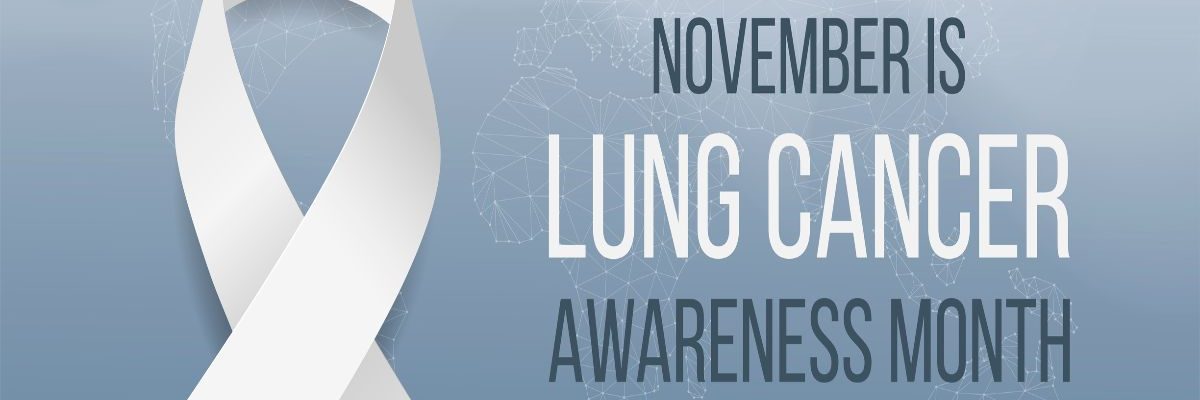November is lung cancer awareness month. This form of cancer takes more lives each year than any other form of the disease. Smoking creates a significant risk of lung cancer. However, the disease can also occur in people who do not and have not smoked. As with any form of cancer, the sooner it is identified, the better the chances the patient has for effective treatment and longer survival.
What is Lung Cancer?
Cancer occurs in the body when certain cells grow out of control. When cell growth occurs in the lungs, the condition is called lung cancer. According to the American Lung Association, there are two major types of lung cancer—”non-small cell lung cancer and small cell lung cancer. These types ocancer grow and are treated differently. Non-small cell lung cancer is more common than small cell lung cancer.”
Lung Cancer Can Spread to Other Organs
Lung Cancer may begin in the lungs and spread to other organs or the person’s lymph nodes. A person may also have another type of cancer that spreads to their lungs. The spread of cancer within the body is called metastases.
Symptoms of Lung Cancer
Lung cancer symptoms can vary. According to the Centers for Disease Control (CDC), some of the more common symptoms of the disease include but are not limited to the following:
- Chronic or frequent coughing
- Chest pain
- Wheezing
- Shortness of breath
- Coughing up blood
- Frequent fatigue
- Unexplained weight loss
Individuals with this disease may also have recurring pneumonia and enlarged or swollen lymph nodes in the chest area between the lungs. These symptoms may indicate the presence of this type of cancer or another illness.
Risks of Lung Cancer
There are various risk factors for lung cancer. However, according to the American Cancer Society (ACS), approximately 80% of lung cancer-related deaths are believed to be caused by smoking. In addition, those who breathe secondhand smoke or environmental tobacco smoke are also at increased risk of developing this form of cancer. According to the CDC, secondhand smoke is thought to cause 7,300 lung cancer-related deaths yearly among adults who don’t smoke. The second leading cause of the disease in the United States and the leading cause for non-smokers is Radon exposure. Breathing concentrated radon exposes the lungs to radiation.
Exposure to asbestos in environments such as textile plants, mines, shipyards, and places where insulation is used may also lead to lung cancer. Individuals with asbestos exposure are believed to be at greater risk for developing mesothelioma, a type of cancer that begins in the lining of the lungs. Lung cancer can also be caused by other workplace and environmental exposure to known carcinogens.
Lung Cancer Screening and Detection
Lung cancer often goes undetected until the disease is at a more advanced stage. As with any form of cancer, timely diagnosis and treatment are crucial. Someone with lung cancer needs to be treated as soon as possible. When a person goes without detection and treatment, their chances of recovery and survival can be greatly diminished.
Missed Lung Cancer Diagnoses
Patients rely on doctors and other medical professionals to listen to them, identify potential ailments, order appropriate testing, and make timely and accurate diagnoses. When a medical professional misses or delays a lung cancer diagnosis, the patient’s likelihood of survival or having an improved outcome could be diminished. In this circumstance, the provider’s negligence did not cause the health condition but may have deprived the patient of life-saving or extending care. Under these circumstances, a person with lung cancer may have suffered grievous and irreparable harm and have a claim that their provider’s negligence diminished their chance of recovery.
If you or a loved one has suffered a missed or delayed lung cancer diagnosis, you may be able to seek compensation. However, these medical negligence cases are complex, and you will want to work with an experienced New York medical malpractice attorney. Your medical malpractice lawyer can assist you with assessing and presenting your missed cancer diagnosis medical malpractice case.
Contact an Experienced Medical Malpractice Attorney
At Bonina & Bonina, PC, we believe that every person with cancer deserves a full opportunity for early detection, early treatment, and complete cure. When someone is denied the opportunity for a complete cure, we fight zealously to protect and advance their legal rights. We fight for expedited discovery schedules and expedited trials on behalf of cancer survivors who were the victims of delayed diagnosis.
We have successfully fought on behalf of many clients in cases involving a delayed diagnosis of breast cancer, colon cancer, Hodgkin’s disease, and many other cancers.
If you or a loved one has been injured due to a missed or delayed lung cancer diagnosis and you want the facts of that medical care investigated, you should contact the Med Law team at 1-888-MEDLAW1 or contact us online to schedule your free consultation. Se Habla Espaňol. Home and hospital visits are available.

